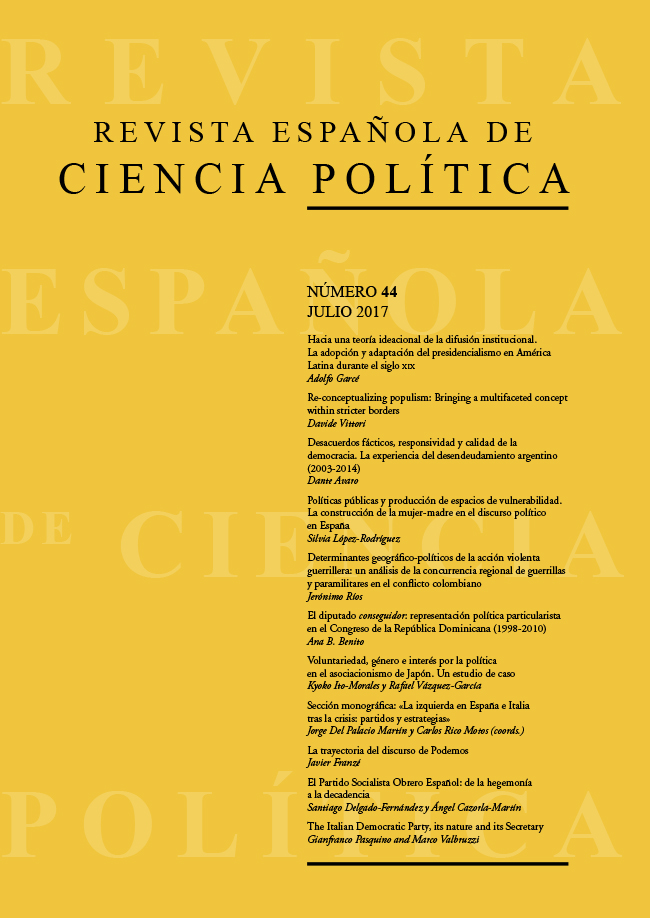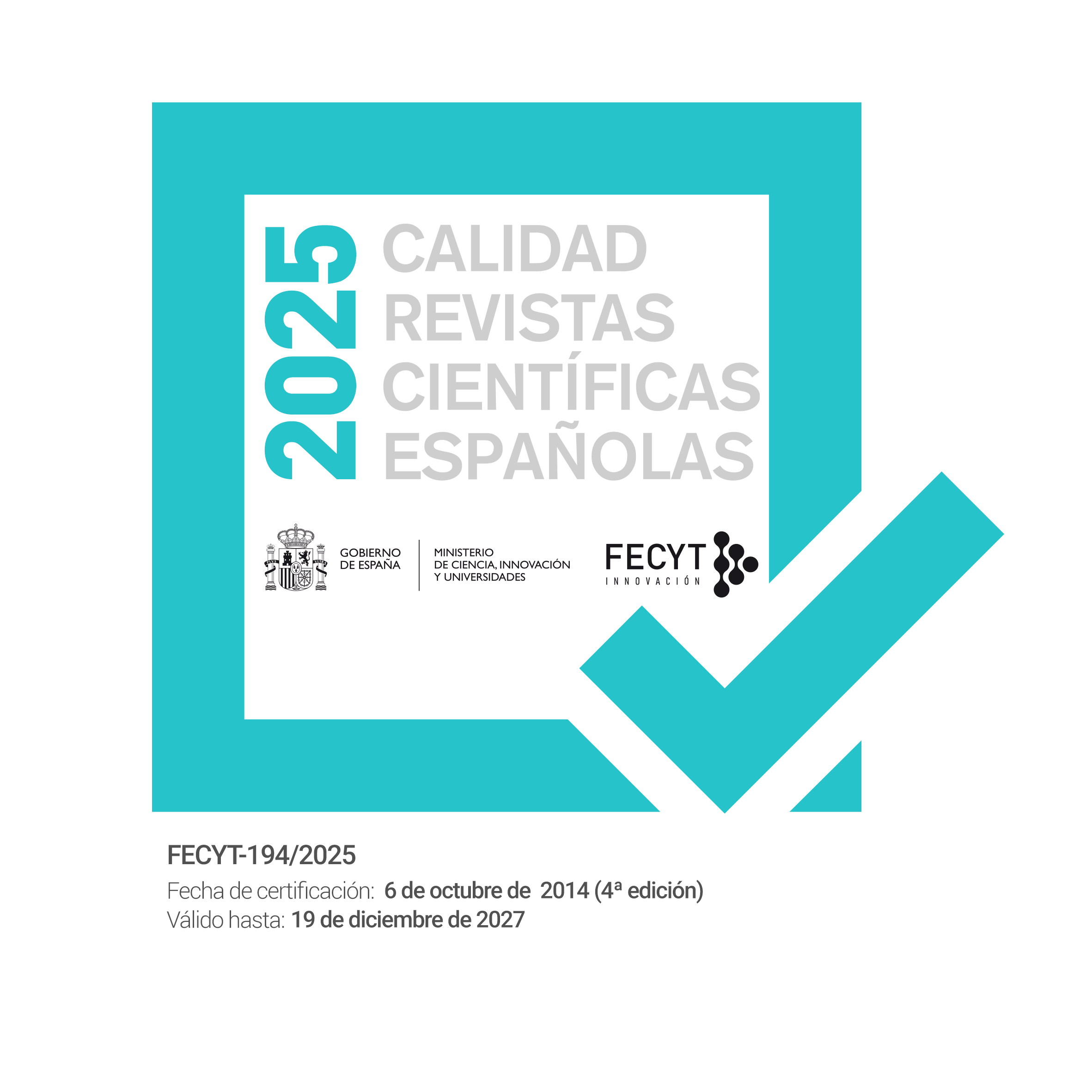Voluntariedad, género e interés por la política en el asociacionismo de Japón. Un estudio de caso
DOI:
https://doi.org/10.21308/recp.44.07Palabras clave:
Participación cívica, asociaciones voluntarias, voluntarismo cívico, diferencias de género, interés político, Japón.Resumen
Los estudios sobre la participación en asociaciones cívicas voluntarias muestran una relación positiva con la participación política. Este trabajo estudia si el tipo de participación (voluntaria o no) se relaciona de la misma manera con el nivel de interés por los asuntos sociopolíticos, usando para ello evidencias del caso de Japón. Los resultados apuntan que la distinción entre participación voluntaria y no voluntaria resulta especialmente relevante para el caso de los hombres. Asimismo, los resultados indican que las variables de recursos del modelo de voluntarismo cívico parecen ser las más relacionadas con el interés por la política, excepto en el caso de las mujeres, donde no se sigue la misma pauta.
Descargas
Citas
Almond, Gabriel y Sidney Verba. 1963. The civic culture: political attitudes and democracy in five nations. Princeton: Princeton University Press. Disponible en: https:// doi.org/10.1515/9781400874569.
Ayala, Louis. 2000. «Trained for democracy: The differing effects of voluntary and involuntary organizations on political participation», Political Research Quarterly, 53 (1): 99-115. Disponible en: https://doi.org/10.1177/106591290005300105.
Barber, Benjamin R. 1984. Strong democracy: Participatory politics for a new age. Berkeley: University of California Press.
Bell, Daniel. 2006. Beyond liberal democracy: Political thinking for an east Asian context. Princeton, N. J.: Princeton University Press. Disponible en: https://doi. org/10.1515/9781400827466.
Bell, Daniel. 2016. «Communitarianism», en Edward N. Zalta (ed.), The Stanford encyclopedia of philosophy (summer 2016 edition). Disponible en: http://plato.stanford.edu/archives/sum2016/entries/communitarianism/.
Bellah, Robert N., Richard Madsen, William M. Sullivan, Ann Swidler and Steven M. Tipton. 2007. Habits of the Heart: Individualism and Commitment in American Life. Berkeley: University of California Press.
Beng-Huat, Chau. 1999. «‘Asian-values’ discourse and the resurrection of the social», East Asia Cultures Critique, 7 (2): 573-592. Disponible en: https://doi. org/10.1215/10679847-7-2-573.
Boix, Carles y Daniel N. Posner. 1998. «Social capital: Explaining its origins and effects on government performance», British Journal of Political Science, 24 (4): 686-693. Disponible en: https://doi.org/10.1017/S0007123498000313.
Burns, Nancy, Kay L. Schlozman y Sidney Verba. 2001. The private roots of public action: Gender, equality and political participation. Cambridge, Massachusetts; London: Harvard University Press.
Chan, Joseph. 1997. «An alternative view», Journal of Democracy, 8 (2): 35-48. Dis-ponible en: https://doi.org/10.1353/jod.1997.0018.
Cohen, Joshua y Joel Rogers. 1992. «Secondary associations and democratic governance», Politics and Society, 20 (4): 393-472. Disponible en: https://doi.org/10.11 77/0032329292020004003.
Dekker, Paul y Loek Halman. 2003. The values of volunteering: cross-cultural perspectives. New York: Kluwer Academic/Plenum Publishers. Disponible en: https://doi. org/10.1007/978-1-4615-0145-9.
Delli Carpini, Michael X. y Scott Keeter. 1992. «The gender gap in political knowledge», The Public Perspective, 3 (5): 23-26.
Ellis, Susan y Katherine Campbell. 2005. By the people: A history of Americans as volunteers. Philadelphia: Energize.
Ellison, Christopher y Darren Sherkat. 1995. «The ‘semi-involuntary institution’ revisited: Regional variations in church participation among black Americans», Social Forces, 73 (4): 1415-1437. Disponible en: https://doi.org/10.2307/2580453.
Eztioni, Amitai. 1993. The spirit of community: rights, responsibilities, and the communitarian agenda. New York: Crown Publishers.
Etzioni, Amitai, Andrew Volert y Elanit Rothschild. 1994. The communitarian reader: beyond the essentials. Lanham: Rowman and Littlefield Publishers.
Fraile, Marta y Raúl Gómez. 2017. «Bridging the enduring gender gap in political interest in Europe: The relevance of promoting gender equality», European Journal of Political Research. Disponible en: htpps://doi.org/10.1111/1475-6765.12200
Gelb, Joyce. 2003. Gender policies in Japan and the United States. New York, Hampshire: Palgrave Macmillan. Disponible en: https://doi.org/10.1057/9781403976789.
Haddad, Mary. 2007. Politics and volunteering in Japan: A global perspective. Cambridge, etc.: Cambridge University Press. Disponible en: https://doi.org/10.1017/ CBO9780511510120.
Haddad, Mary. 2010. «The state-in-society approach to the study of democratization with examples from Japan», Democratization, 17 (5): 997-1023. Disponible en: https://doi.org/10.1080/13510347.2010.501182.
Holdgrün, Phoebe y Barbara Holthus. 2014. Gender and political participation in post 3/11 Japan. Deutsches Institut Für Japanstudien working paper 14/3. Disponible en: http://www.dijtokyo.org/publications/WP1403_Holdgruen_Holthus.pdf.
Inglehart, Ronald y Pippa Norris. 2003. Rising tide: Gender equality and cultural change around the world. Cambridge: Cambridge University Press. Disponible en: ttps://doi.org/10.1017/CBO9780511550362.
Kingston, Jeff. 2004. Japan’s quiet transformation: Social change and civil society in the 21st century. London: Routledge.
LeBlanc, Robin. 1999. Bicycle citizens: The political world of Japanese housewife. Berkeley: University of California Press.
Maan, Xandra. 2011. Social capital and civic voluntarism: A socio-political explanation of political participation. Bachelor thesis, University of Twnte. Disponible en: http://essay.utwente.nl/62739/1/Bscverslag_XandraMaan_s0191094.pdf.
Masuyama, Mikitaka y Masahiro Yamada. 2008. «Seiji sanka no zyendā gyappu (diferencia de género sobre la participación política)», en Mikitaka Masuyama (ed.), Keiryō seiji bunsei nyūmon (Introducción al análisis cuantitativa de la ciencia política). Tokio: Tōkyō daigaku syuppan kai.
Morales Diez de Ulzurrun, Laura. 2002. «Associational membership and social capital in comparative perspective: A note on the problems of measurement», Politics and Society, 3 (3): 497-523. Disponible en: https://doi.org/10.1177/0032329202 030003005.
Newton, Kenneth. 1999. «Social capital and democracy in modern Europe», en Jan W van Deth, Marco Maraffi, Ken Newton y Paul F. Whiteley (eds.), Social capital and European democracy. London: Routledge.
Ōyama, Nao. 2002. «Seiji teki taido to kōdō ni miru zyendā (comportamiento político y el género)», Tōkai daigaku kiyō bungaku bu (Boletín del Departamento de Literatura de la Universidad de Tōkai), 78: 167-183.
Paxton, Pamela. 2002. «Social capital and democracy: An interdependent relationship». American Sociological Review, 67 (2): 254-277. Disponible en: https://doi. org/10.2307/3088895.
Pateman, Carole. 1970. Participation and democratic theory. Cambridge: Cambridge University Press. Disponible en: https://doi.org/10.1017/CBO9780511720444.
Pekkanen, Robert. 2004. «Japan: social capital without advocacy», en M. Alagappa (ed.), Civil society and political change in Asia: expanding and contracting democratic space. Stanford, California: Stanford University Press.
Pekkanen, Robert. 2006. Japan’s dual civil society: Members without advocates. Stan-ford, California: Stanford University Press.
Pérez-Fuentes, Pilar. 1990. «Condicionamientos de la participación política de las mujeres», en Judith Astelarra (comp.), Participación política de las mujeres. Madrid: Centro de Investigaciones Sociológicas.
Persell, Caroline H., Adam Green y Liena Gurevich. 2001. «Civil society, economic distress, and social tolerance», Sociological Forum, 16 (2): 203-230. Disponible en: https://doi.org/10.1023/A:1011048600902.
Pidgeon, Walter P. (1998). The universal benefits of volunteering: A practical workbook for nonprofit organizations, volunteers, and corporations. New York: Wiley.
Putnam, Robert. 2000. Bowling alone: The collapse and revival of American community. New York: Simon and Schuster. Disponible en: https://doi.org/10.1145/ 358916.361990.
Putnam, Robert, Robert Leonardi y Raffaella Nanetti. 1993. Making democracy work: Civic traditions in modern Italy. Princeton, New Jersey: Princeton University Press.
Pye, Lucian W. y Mary W. Pye. 1985. Asian power and politics: The cultural dimensions of authority. Cambridge, Massachusetts: Belknap Press.
Rawls, John. 1971. A theory of justice. Cambridge, Massachusetts: Harvard University Press.
Rosenblum, Nancy L. 1998. Membership and morals: The personal uses of pluralism in America. Princeton, Chichester: Princeton University Press.
Sandel, Michael J. 1998. Liberalism and the limits of justice. Cambridge: Cambridge University Press. Disponible en: https://doi.org/10.1017/CBO9780511810152.
Schlozman, Key L., Nancy Burns y Sidney Verba. 1994. «Gender and the pathways to participation: The role of resources», The Journal of Politics, 56 (4): 963-990. Disponible en: https://doi.org/10.2307/2132069.
Schlozman, Key L., Sidney Verba y Henry E. Brady. 2012. The unheavenly chorus: Unequal political voice and the broken promise of American democracy. Princeton, Oxford: Princeton University Press. Disponible en: https://doi.org/10.1515/9781400841912.
Schwartz, Frank y Susan Pharr (eds.). 2003. The state of civil society in Japan. Cambridge: Cambridge University Press.
Takeda, Yuka. 2010. «Seiji sanka ni okeru gyendā gyappu (Diferencias de género sobre la participación política)», JGSS Research Series, 7: 323-335.
Tanaka, Minoru. 2000. Sekai no zyūmin soshiki: azia to ōbei no kokusai hikaku (Asociaciones de vecinos en el mundo: comparaciones internacionales entre países asiáticos y occidentales). Tokio: Zichitai kenkyū sha.
Tiefenbach, Tim y Phoebe Holdgrün. 2015. «Happiness through participation in neighborhood associations in Japan? The impact of loneliness and voluntariness», Voluntas, 26: 69-97. Disponible en: https://doi.org/10.1007/s11266-014-9520-8.
Tiefenbach, Tim y Florian Kohlbacher. 2013. Happiness and life satisfaction in Japan by gender and age. Deutsches Institut Für Japanstudien working paper, 13/2. Disponible en: http://www.dijtokyo.org/publications//WP1302_Tiefenbach_Kohlbacher.pdf.
Tocqueville, Alexis de. 2003. Democracy in America. London: Penguin Books.
Torigoe, Hiroyuki. 1994. Chiiki zichikai no kenkyū (Estudio sobre asociaciones de vecinos locales). Tokio: Mineruva shobō.
Tu, Wei-ming (ed.). 1996. Confucian traditions in East Asia modernity: Moral education and economic culture in Japan and the four mini-dragons. Cambridge, Massachusetts: Harvard University Press.
Van Deth, Jan W. (2006) «Democracy and involvement. The benevolent aspects of social participation», en Mariano Torcal y José Ramón Montero (eds.), Political disafecction in contemporary democracies. Social capital, institutions and politics. London: Routledge.
Vázquez García, Rafael. 2010. Compromiso cívico y democracia: los efectos democráticos del asociacionismo sociopolítico en España. Sevilla: Fundación Pública Andaluza Centro de Estudios Andaluces.
Verba, Sidney, Kay L. Schlozman y Henry E. Brady. 1995. Voice and equality. Cambridge, Massachusetts: Harvard University Press.
Verba, Sidney, Nancy Burns y Kay L. Schlozman. 1997. «Knowing and caring about politics: gender and political engagement», The Journal of Politics, 59 (4): 1051- 1072. Disponible en: https://doi.org/10.2307/2998592.
Verba, Sidney, Kay L. Schlozman y Henry E. Brady. 2002. Voice and equality: Civic voluntarism in American politics. Cambridge, Massachusetts: Harvard University Press.
Verge, Tania. y Raúl Tormos. 2012. «The persistence of gender differences in political interest», Revista Española de Investigaciones Sociológicas, 138: 89-108. Disponible en: https://doi.org/10.5477/cis/reis.138.89.
Vinken, Henk, Yuko Nishimura, Bruce L.J. White y Masayuki Deguchi (eds.). 2010. Civic engagement in contemporary Japan: Established and emerging repertories. New York, Dordrecht, Heidelberg, London: Springer.
Warren, Mark. 2001. Democracy and association. Princeton, New Jersey: Princeton University Press.
Wilson, Victoria. 2007. «The associational roots of the political participation gender gap», paper delivered at the 2007 Midwest Political Science Association Meetings, Chicago.
Wollebaek, Dag y Per Selle. 2002. «Does participation in voluntary associations contribute to social capital? The impact of intensity, scope, and type», Nonprofit and Voluntary Sector Quarterly, 31 (1): 32-61. Disponible en: https://doi. org/10.1177/0899764002311002.
Wollebaek, Dag y Per Selle. 2003. «The importance of passive membership for social capital formation», en Marc Hooghe y Dietlind Stolle (eds.), Generating social capital: Civil society and institutions in comparative perspective. New York: Palgrave Macmillan. Disponible en: https://doi.org/10.1057/9781403979544_4.
Yamazaki, Takeo. 1999. Chiiki no zidai no chōnai kai, zichi kai, comyunithi (Asociaciones de vecinos en la era de locales). Tokio: Zichitai kenkyū sha.
Archivos adicionales
Publicado
Cómo citar
Número
Sección
Licencia
Derechos de autor 2017 Kyoko Ito-Morales, Rafael Vázquez García

Esta obra está bajo una licencia internacional Creative Commons Atribución-NoComercial-SinDerivadas 4.0.






